
DHSA Grant Reports
Whether it’s a career change into the world of Cordon Bleu food, completing a medical elective in the Philippines or making a move into teaching with a PGCE certificate, our Old Seniors have used their DHSA Grants to change their lives. Find out about just some of our Old Seniors who have used their grants to re-write their own stories.
Apply now
If you are inspired reading these grant success stories and meet the application criteria, you can apply for your own DHSA grant right now!
Discover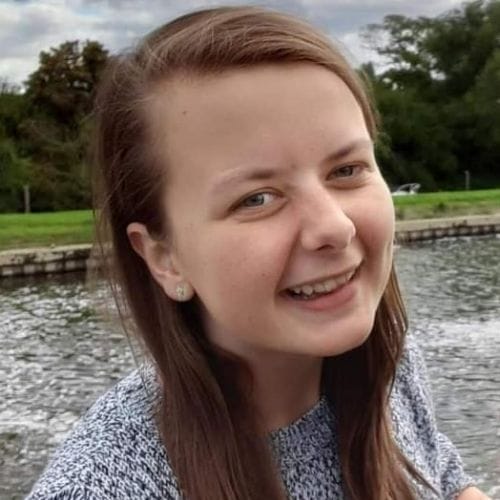
Naomi Vallance
Grant recipient Naomi Vallance (2015) writes about her time studying at University of Winchester and after graduation working in primary education. After reflecting on her career, in 2022 Naomi applied for a Grant to help with her studies for the National Award for Special Educational Needs Co-ordination at the University of Winchester.
Read MoreNaomi Vallance

I left Downe House to pursue Primary Education at the University of Winchester with a particular interest in working with children with Special Educational Needs. This passion started in Sixth Form with the opportunity for volunteering, I volunteered at a local SEN secondary school for one morning a week, helping in class with day-to-day activities and even helping them to produce their Christmas show. The fact that I remember this so clearly from 2014 shows how much I valued that experience!
At university I had three placements, one of which was in a SEN school in Basingstoke. With these experiences, lectures, and seminars it confirmed my passion for supporting vulnerable children and children with SEN. After graduation, I worked in a local primary school for four years working in Key stage 2, years 3-6. During this time, I continued to develop my skills by becoming Head of Design and becoming Head of Pupil Premium funding. This funding is for disadvantaged pupils to help improve their educational outcomes within state schools. Being responsible for this funding, making decisions as to where the funding should be allocated within the school and having to justify my decisions to the governors showed me how much being a teacher can make a difference.
In 2022, I reflected on my career and thought about what I wanted to do next. I had dedicated a considerable amount of my time talking to my current Special Educational Needs Co-ordinator (SENCO) about her role and what I could do to gain more experience. It was with these conversations that led me to explore the National Award for SENCO qualification at the University of Winchester. I applied in April 2022 and was accepted onto the course a few months later, ready to start in the new academic year. It was at this point that I contacted the DHSA for support with the funding for this course.
The course consisted of hybrid learning with lectures online, seminars in person and independent study throughout the year. There were three assignments across the year based on my own personal experience in my current educational setting. The lectures and seminars gave me the opportunity to network and meet with other professionals who support children with SEN such as social workers, council representatives and local politicians. It also led to me delving deeper into my own knowledge and what I could do to support children with SEND.
As I gained the SENCO qualification at the end of my course, in which I gained a merit for my efforts, it prompted me to begin to look for new jobs as a SENCO. As of September 2023, I am a Deputy SENCO at a local secondary school within the Bournemouth area where I am currently living with my fiancé. This role is only for teachers with the SENCO qualification. My role entails supporting all children in this school who have SEN (currently 25% of the school), leading a team of teaching assistants who support these children in class, as well as a bit of teaching on the side. The change to teaching in a secondary school was definitely not expected but I can honestly say that this has been the best move in my career yet.
All of this could not have happened without the DHSA grant which I am eternally grateful for. If you are considering changing a career or looking to gain more qualifications, I would definitely recommend it, especially as it opens up more doors than you think.
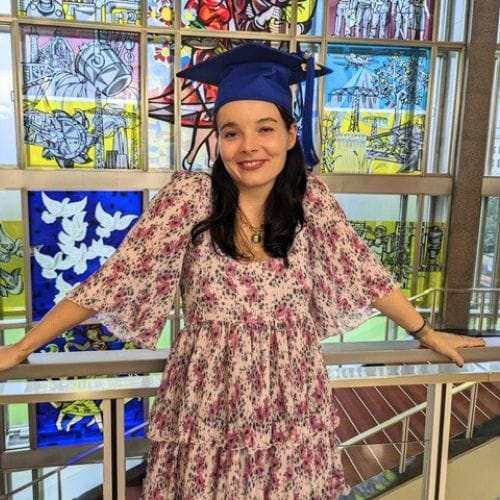
Ellie Rumbold
Grant recipient Ellie Rumbold (2013) writes about her experiences whilst undertaking a Masters in Business Administration at the European School of Management and Technology (ESMT) in Berlin.
Read MoreEllie Rumbold

After leaving Downe House in 2013, I completed a one-year apprenticeship in Music Business with a record label called ‘Mute Records’. From there, I continued working, eventually moving to another record label called ‘Partisan Records’ in 2017, where I have remained for the last six years working as a product manager. As a result, I never found the right moment to do an undergraduate degree. As I continued to develop through my career however, I found myself needing certain business skills and grew interested in exploring executive education degrees, which is what led me to applying for an MBA.
The only school I applied to was ESMT, a business school based in Berlin and founded by 25 global companies including McKinsey, KPMG, The Boston Consulting Group, Siemens, and T-Mobile. The programme I was accepted onto was the Part-Time Master of Business Administration Course which was delivered in a blended format: 75% online and 25% in-person, thus allowing me to work full-time and study simultaneously. The duration of the programme was two years and comprised 14 modules, each lasting approximately 8 weeks and each containing three courses.
Whilst eager to dive in when I started the course in September 2021, I quickly learned that working full-time and juggling a course that demanded an additional 20 hours of my life each week was no easy feat. I also felt like I was certainly thrown in the deep end with some of the early courses too: Microeconomics, Data Science, Finance Management, Business Ethics and Accounting to name a few. We covered all sorts, everything from data regression models to capital asset pricing, from discounted cash flow systems to organisational change theories, from entrepreneurial strategies to queuing theory, why Benihana and Disneyland are such successful business models, and how Netflix eventually conquered Blockbuster in the classic battle between disruptor and incumbent.
I also learned that I have absolutely no desire to ever become an accountant! As I progressed through the masters, I soon found my balance. A highlight of mine was during our ‘Entrepreneurship’ course and being given the opportunity to create a product and pitch it to a board of investors. I was part of a small team, and we went through the entire start-up process: idea generation, forming an entrepreneurial business model, articulating, and testing assumptions, marketing, financing, and eventually pitching for fundraising to turn the idea into reality. One of my other favourite courses was operations management. While challenging, we learned about strategies to better optimise processes, including ways to predict future supply needs based on historical demand. This is a skill which I now use all the time in my everyday job, predicting the quantities of vinyl and CD stock for future releases based on historical sales data, and balancing this with the label’s incoming and outgoing cash flows.
We also learned how to build prediction tools, such as Excel’s ‘SOLVER’, which has since allowed me to better forecast budgets and more effectively predict the effect on projected profit amounts. One year into the two-year course, I was offered a place on an exchange programme at Yale University. The course was ‘Behavioural Science of Management’ and was taught out of Yale’s School of Management (fondly known as SOM). I flew to New York in March 2023 and travelled up to New Haven CT, where I spent a week in various lectures and seminars.
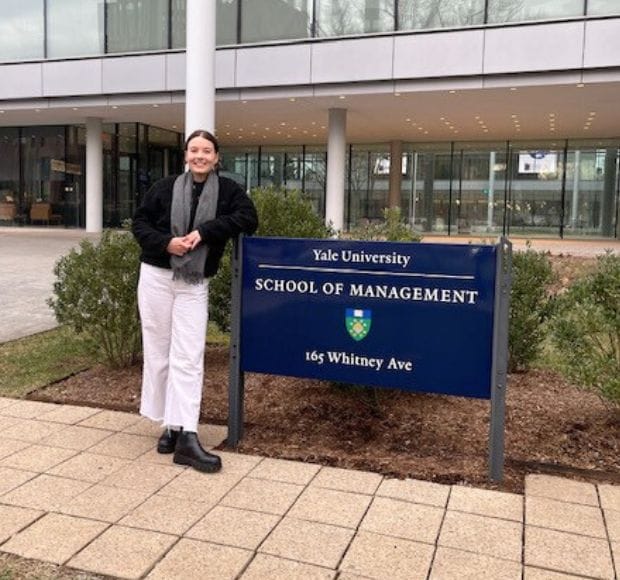
It was an incredible experience to be walking the same corridors as Nobel Prize winning professors such as Robert J. Shiller, who was awarded a Nobel Prize in Economic Science in 2013 for his research at the School of Management that has improved the forecasting of asset prices and helped the emergence of index funds in stock markets. Some of the lectures I attended throughout my week at Yale included ‘Understanding Consumer Experiences’, ‘Making Better Decisions Using Behavioural Science’, ‘The Profound Power of Culture’, ‘Negotiation Mindsets’ and ‘Behavioural Finance’. I also had the pleasure of meeting and spending time with other MBA students from Yale, some of whom took me to the famous post-grad bar ‘The Gryphon’ and to the iconic ‘Louis’ Lunch’: a tiny rustic lunch spot dating back to 1895, with claims of having invented the first hamburger which it still serves on toast.
The remainder of my MBA at ESMT was spent working on my thesis, which, for the part-time course, is designed to solve a real-life business problem that exists in your organisation. In my case, this was an in-depth analysis of Partisan Records’ global digital distribution solution, exploring ways to better optimise the way the company distributes music to digital streaming platforms around the world, such as Spotify, Apple Music, Amazon, and YouTube Music. The idea of trying to solve a real-life business problem was daunting at first, but I am so grateful for all the support of everyone at my company as I ventured through it, not to mention their patience while I pestered them with endless questions and requests for data.
After a wonderful week away in Athens with 30 of my classmates to celebrate the end of the course in August, I officially graduated at the start of October 2023. I was over the moon to graduate with a first-class master’s degree, coming 12th in class overall from my cohort of 50 classmates. Doing this MBA has been one of the most challenging yet rewarding experiences of my entire life, and I owe a huge debt of gratitude to the Downe House Seniors Association for their extremely generous contribution towards the fees of my degree.
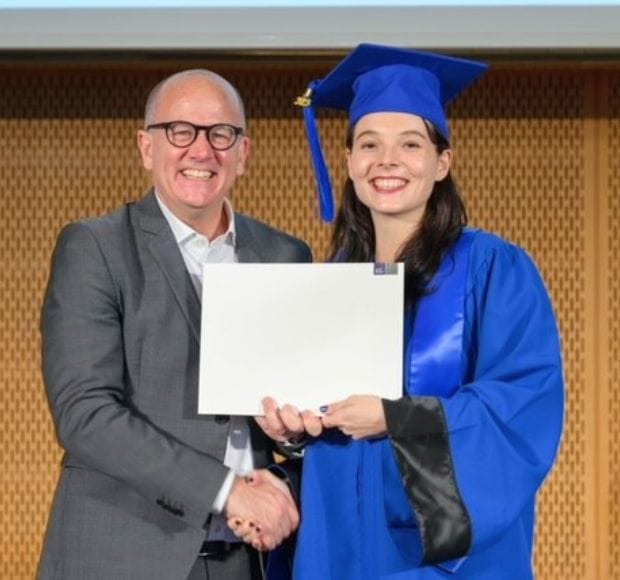
None of this would have been possible without their help, and I really am forever grateful for that. As I write this, I am still living and working in Berlin full-time, and I am transitioning into a ‘Director of International’ role at Partisan Records in January 2024. This role will essentially involve overseeing the marketing, operations, and business development of the label in Europe, Asia, South America and Australia and New Zealand.
I am beyond excited for what the future holds, and I’d like to say a final thank you to the DHSA and everyone who has supported me in getting to this point. Here’s to future, fearless enjoyment.
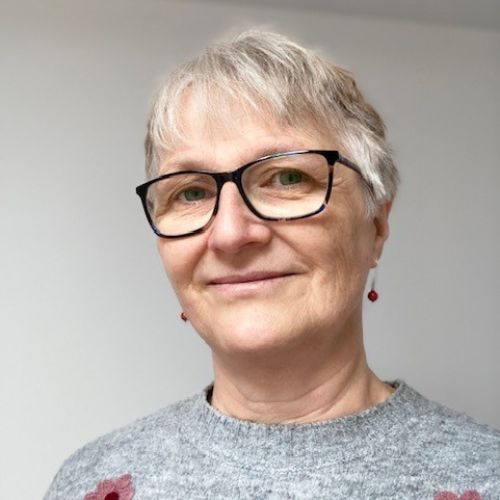
Marigold Short
Grant recipient Marigold Short (Lewis, 1979), has been awarded an MA with Merit in Fine Art from the University of Northampton, using the DHSA Award to fund the materials for her final module.
Read MoreMarigold Short

My most recent work has been a working out of my memories, shrouded in the mists of time, that stem from the womb. I am a bereaved-at-birth twin. This state of being has driven a life-long interest in the nebulous; those thoughts and feelings that are so hard to pin down and explain to others. John Donne wrote, “No man is an island, Entire of itself.” We are relational beings and the idea of relationship manifests in my work.
Most recently I have been working with sheer fabrics to speak of the difficulty in grasping an idea or thought or memory or feeling that is just out of reach. The Ties that Bind: Life before Birth: a Homage to Robert. (2023) was the culmination of two years of study and experimentation into how to visualise my memories of the time my twin brother and I spent together.
I have just been awarded an MA with merit in Fine Art from the University of Northampton. The grant from the Seniors Association has enabled me to buy a relief press, and other printing materials that will continue to be a valuable resource in my practice. These will allow me to investigate process and materials further. I am very interested in where paint and print overlap. The grant also financed the purchase of fabric for the textile installation I made for the final module.
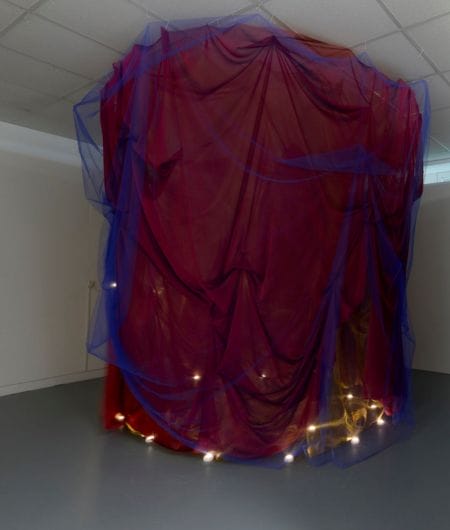
The installations I make are all about relationships. Mostly about the loss of a relationship; the expression of deeply felt hurt. Whilst doing the course I was awarded a commission with English Heritage to create an installation in Rushton Triangular Lodge. It is a fascinating building. Designed by Sir Thomas Tresham whilst in prison for his faith, the exterior is rich with symbolism. The exhibition will be open to the public in the summer of 2024.
As well as working in textiles, I use paint, print, sound, video and collage. I have been fortunate to be able to study Fine Art at the University of Northampton for both the BA and the MA. I found having the space to explore different media enriching and exciting. I was at Downe from 1974 to 1979. Some of my happiest times were spent in the art room. The teaching I received has been a good foundation for my subsequent work. I am grateful to the DHSA for the grant.
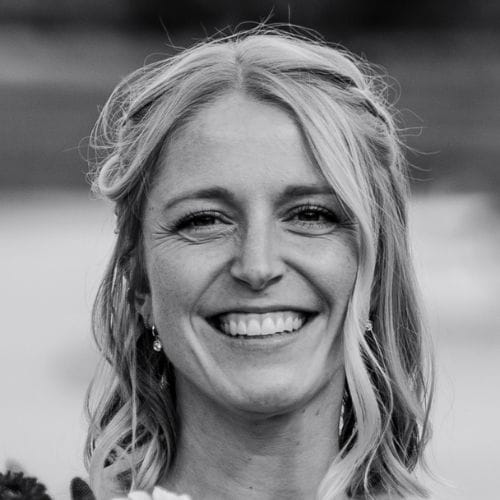
Jo Henley
Award recipient Jo Henley (2010) has transitioned from being a family lawyer, to being a family mediator, with a DHSA grant supporting her retraining.
Read MoreJo Henley

When my partner was offered a job which raised the prospect of leaving the UK for an adventure in Vermont, it felt like a rare and special opportunity and one worth taking.
The opportunity to uproot arrived as I was a Solicitor in the family department at law firm Mishcon de Reya in London. I loved my job as a family lawyer. I felt I had cheated the system, qualifying as a lawyer but working in a fascinating and meaningful area of law based on fairness, equality and the welfare of children. Building relationships with clients and guiding them through some of the most difficult moments in their life never felt like work. However, I was becoming increasingly disillusioned with the family court system as a method of resolving family disputes, particularly where children were involved. I saw couples lose huge amounts of money, and any prospect of positively co-parenting their children, as they navigated a court system rife with backlogs and (occasionally) uncollaborative lawyers who further ostracised separating couples.
Moving country meant changing jobs, and changing jobs meant reassessing what I did for work.
I wanted to use the legal knowledge I had built, as well as my communication skills, to help families work towards better, more collaborative, and longer-term solutions. I believe that the people best equipped to make decisions about their own family, their own finances, their own children, are the couple themselves (separating or not). Making court applications in relation to finances or children means handing over this decision-making power to someone completely unknown to the family – a Judge. Mediation, on the other hand, is a voluntary process which is confidential and leaves the decision-making power in the hands of the couple. I have seen first-hand how skilled mediators can work magic in high conflict family dynamics. A good mediator creates a safe space for difficult conversations and facilitates discussions with a view to participants better understanding each other and reaching resolutions that suit them and their families.
And so I decided to transition from being a family lawyer, to family mediator.
I am hugely grateful to the DHSA who provided a grant to fund my retraining. I completed two Vermont-based mediation courses, and a UK family mediation course approved by the Family Mediation Council (the regulatory body for family mediators in the UK). These courses built on my family law skills and involved a significant amount of learning in child brain development, substance use disorders, family system dynamics, managing conflict, communication styles and co-parenting skills. I believe I have learnt more, both personally and professionally, through these courses than I did from my previous five years working as a family lawyer in London. I have now set up my family mediation business, Jo Henley Mediation (henleymediation@gmail.com, 0203 026 9832) and provide family mediation services to UK clients (remotely) and US clients. The work is everything I hoped it would be. It is moving, gratifying, and effective in reducing family conflict and the emotional and financial costs of separation/divorce.
So far Burlington, Vermont has also not disappointed – a half-hour drive to the nearest ski slopes, fiery-Fall foliage, positioned on an enormous lake bordering Quebec and the Adirondacks, and next to a mountain range littered with hiking trails and Summer swim holes. Thank you again to the DHSA who made my career pivot, and therefore my relocation, possible.
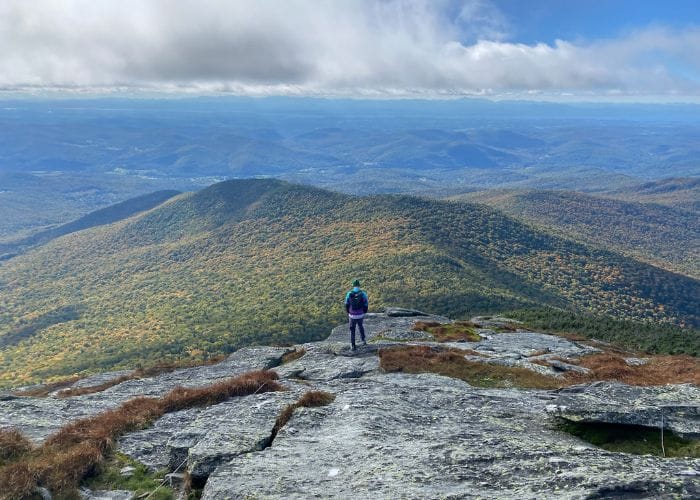

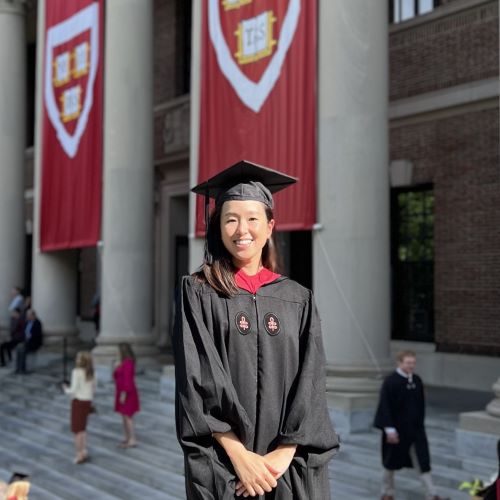
Jen Mae Low
Grant recipient Jen Mae Low (2004), five years after graduating medical school, took a break from clinical work to undertake a Masters in Public Health at Harvard University.
Read MoreJen Mae Low

Jen Mae writes:
Five years after graduating from medical school, I chose to pursue specialist training in Infectious Diseases and Microbiology with impeccable (or unfortunate, depending on how you look at it) timing at the beginning of 2020. 18 months and relentless waves of Covid-19 patients later, I was ready to take a break from clinical work and applied for a Masters in Public Health at Harvard University. The pandemic had truly forced me to consider our healthcare system as a whole, instead of the blinkered view I’d had of the individuals in front of me or the hospitals that employed me. As hospitals and ICUs reached capacity and staffing levels were stretched increasingly thin, uncertainties regarding the NHS’ sustainability had never felt more palpable. I wanted to acquire skills which would enable me to analyse pertinent organisational problems as the first step towards developing strategies and inventive solutions.
On a greater level, the Covid-19 pandemic had highlighted the pervasive health inequities that exist both within the UK and globally. High income countries consistently reported higher rates of morbidity and mortality amongst minority ethnic groups, and hoarded vaccines as the rest of the world watched on. I felt compelled to delve deeper into the social determinants of health, and to start having conversations which challenged my own perceptions and beliefs. I looked forward to returning to education for the people, the diverse encounters, and the intermingling of minds.
As such, I ended up with an extremely varied selection of courses, including but not limited to Biostatics and Epidemiology, Financial Management and Analysis, Bioethics in Global Health, and Design Thinking. I also took the opportunity to cross-register in classes at Harvard Business School and MIT and co-founded a start-up developing sustainable ways to repurpose single-use face masks. My degree culminated in a final project working with the International Association of Providers of AIDS Care (IAPAC) to research and contribute to the “Building Health Systems Resiliency” section of the IAPAC-Lancet HIV Commission on the Future of Urban HIV Responses. The commission seeks to examine and analyse barriers to accessing care, summarise best practices whilst reflecting global diversity, and anticipate future challenges in HIV prevention, care, and treatment. Committee meetings provided an amazing opportunity to learn from and exchange ideas with inspirational leaders in the field of HIV, and hopefully this synergy will be evident when the final report is published at the end of 2022.
Moving halfway across the world to start a new school year was arguably more challenging at the age of 30 than 13, but I am immensely grateful to DHSA for facilitating this incredibly enriching experience. Degrees from leading institutions are almost exclusively markers of one’s access, and since returning to London I have been able to reflect further on my immense privilege. Lawrence Bacow, Harvard’s president, reminded us during the Commencement ceremony to “save a seat and make room for others to ensure that the opportunities afforded by our education do not enrich our lives alone”. As I progress through the next few years of specialty training, and indeed the rest of my career, I look forward to seeking out ways in which my newly acquired knowledge and skills can have a positive impact on those less fortunate.
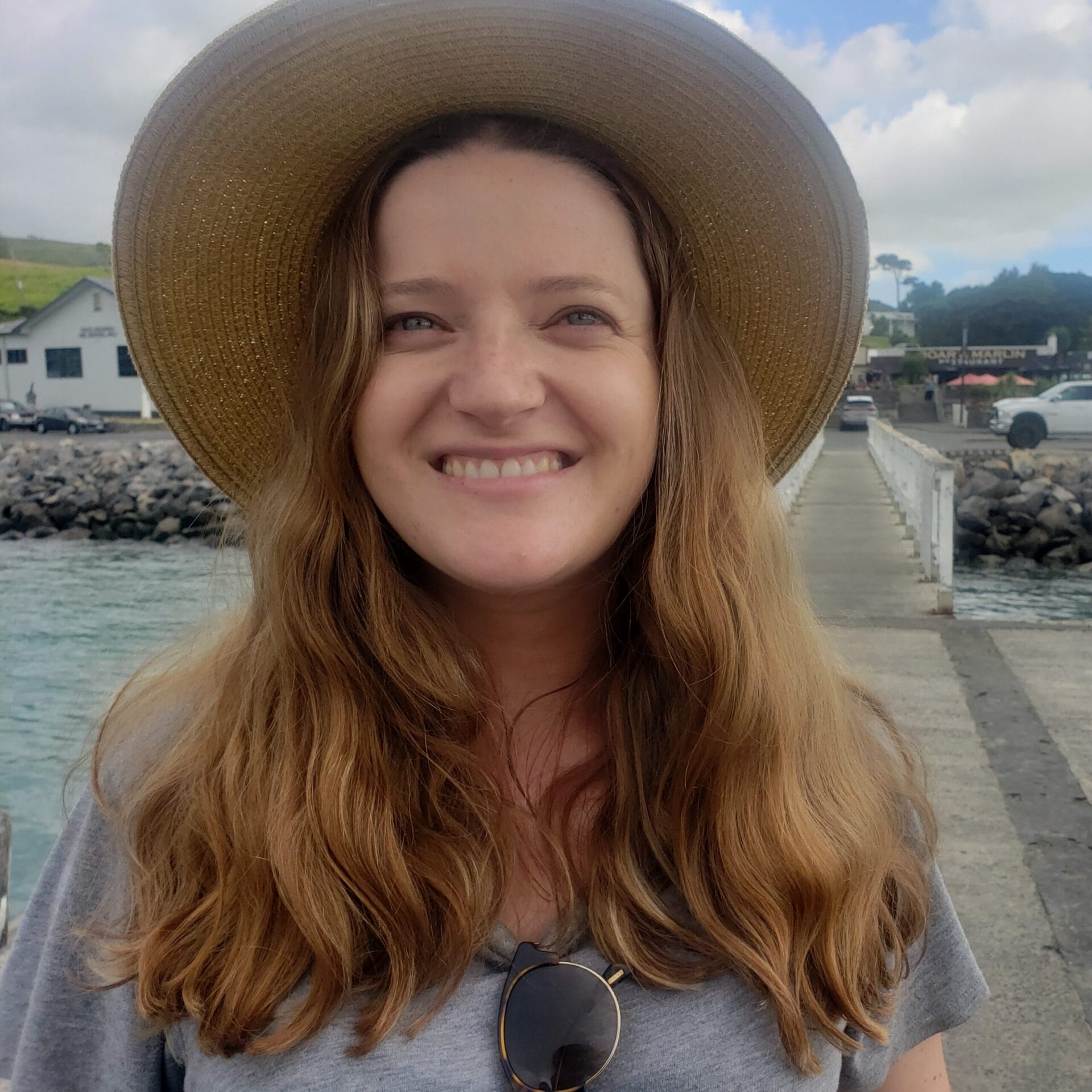
Carrie Mallows
Grant recipient Carrie Mallows (2002) moved to New Zealand after three years of teaching in Hong Kong, and applied to The University of Auckland as a mature student for further teacher qualifications.
Read MoreCarrie Mallows

When the first covid lockdown hit in 2020, I had just moved to New Zealand with my partner. I was at a bit of a crossroads, career-wise, as I had spent the previous three years teaching in Hong Kong, but did not have the correct qualifications to teach here in New Zealand. After a lot of soul-searching I realised the option that made sense for me, would be to apply to a university over here in order to qualify as a primary school teacher.
I now know that the process of applying as an international student is not entirely straight-forward, but the support to the DHSA really helped smooth things along, and set me up for the life as a mature student.
The course at the University of Auckland was fantastic, and the year flew by. Despite some lockdown-related hiccups, my cohort made it through! I have now spent four happy months teaching a combined years five and six class at a wonderful school in central Auckland.
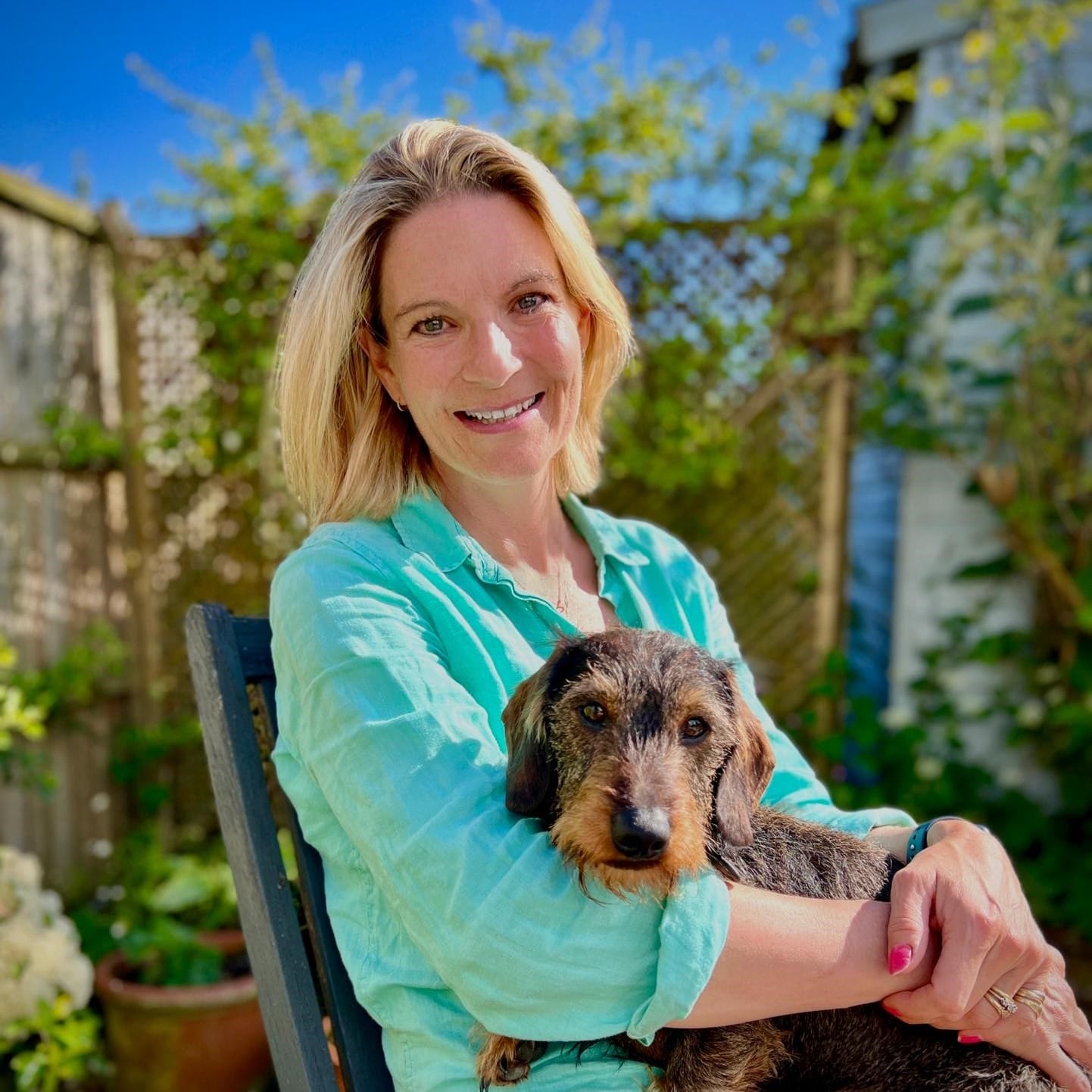
Pippa Durrant
Grant recipient Pippa Durrant (Parkinson, 1991) – was awarded a grant to train as a children and teen therapist through Ollie and his Superpowers.
Read MorePippa Durrant

Until March 2020 I was running a successful Bed and Breakfast near Stonehenge. However, this changed overnight when the pandemic hit and I was left with no guests, no income and everyone at home trying to work. I signed up for the Covid 19 vaccination programme because I wanted to do my bit and help the fight the disease. While doing this role, I realized how much people needed to talk and offload. I found that I enjoyed providing a listening ear and a calm presence. I realised then that I really didn’t want to go back to the hospitality industry, and that my heart was really in helping people.
It was while reading Psychologies magazine, that I saw an article about Ollie and his Superpowers: how they were looking for people to join ‘Ollie’s army’ to help empower children (and adults) to manage their emotions. I quickly signed up and in July 2020 I found myself in a Zoom classroom with ten other Ollie students. It was pretty terrifying having been out of education for so long, however, I soon realized that everyone on the course had the same thoughts and ideas as I did and we quickly bonded. The course started off with the first few weekends on Zoom where we learnt all about the underpinning theory to the model, and then were taught the techniques that we will be able to use in therapy. We then moved into the classroom in London where we practiced everything we had been learning over the weeks. I have absolutely loved the course and have learnt so much not only about myself but also ways in which I can help my family and friends.
The Ollie concept was devised by award winning author and therapist, Alison Knowles and uses a number of different methodologies to empower children to seek solutions and take control of their emotions, rather than being controlled by them. The Ollie methodology combines CBT (Cognitive Behavioural Therapy), NLP (Neuro Linguistic Programming), Play Therapy, Positive Psychology and Parts Therapy, and believes that no two therapy sessions are the same because everyone is unique and individual. The course also believes that therapy should be holistic and tailored to the individual needs of the client.
At the beginning it was incredibly confusing with so much to learn, lots to practice and a huge amount of coursework to work my way through. I decided to take it slowly and not put too much pressure on myself, especially as I was still having to look after three children, two dogs, sixteen chickens and a husband!
On top of all the essays, tests, reflective journals, units and practice hours, we also had to write up a number of very detailed case studies using real people with real presenting issues. A somewhat daunting task, however once I started my first one, I realized how much I enjoyed it and how it was starting to come naturally to me. In one of my case studies, I helped a 9 year old girl with a crippling phobia of dogs that prevented her going anywhere. I used a range of techniques to help her and I can now say that she is cured and wants to become a dog trainer!.
As an Ollie coach, I am able to help both adults and children with anything such as anger issues, behaviour issues, grief, stress, anxiety and phobias. Now that I am qualified I am hoping to set up in private practice from home and combine my love of nature and gardening with therapy. I have also signed up for the next course on the Ollie programme which will enable me to deliver parent’s evenings and assemblies within schools and also to work with small groups of children who might need some extra support. I am currently building my website and business with a view to launching myself in September once term starts.
I cannot thank DHSA enough for the very generous grant that has enabled me to retrain and take my career in a different and more fulfilling direction. I am passionate about helping children and teenagers with their mental health and I am hoping I will be able to help many people over the years. There is a huge need for qualified therapists especially since the pandemic and waiting lists for CAMHS (Children and Adolescent Mental Health Service) are at an all time high. Thank you Downe House.
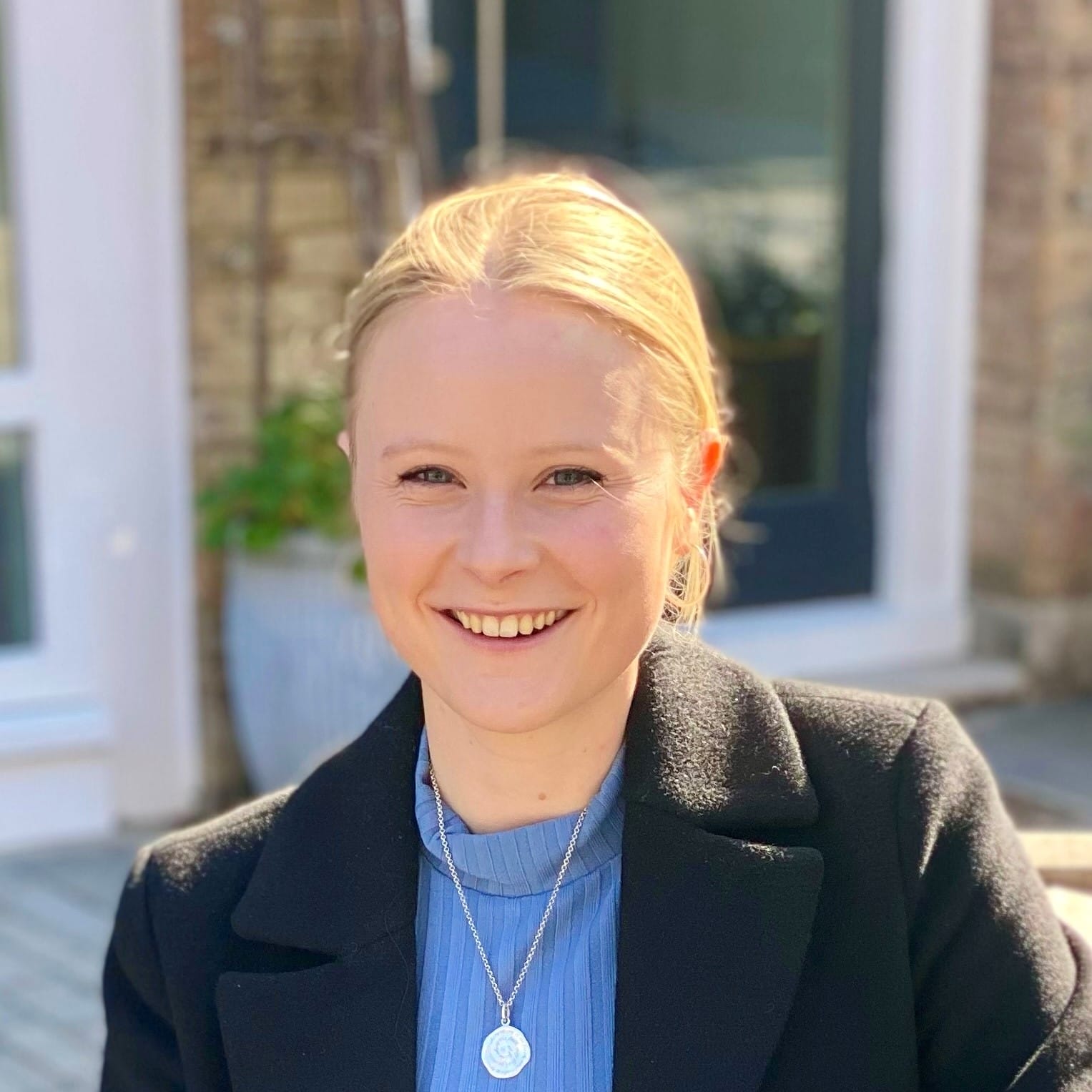
Emily Gordon Lennox
Grant recipient Emily Gordon Lennox (2013) made a decision to become a bookkeeper whilst working as a Gallery Assistant and has recently qualified in Bookkeeping and Accounts through the Institute of Certified Bookkeepers.
Read MoreEmily Gordon Lennox

Thanks to the DHSA Grant, I have recently completed a qualification in Bookkeeping and Accounts, through the Institute of Certified Bookkeepers, achieving Distinction with Honours. This has given me the ability to complete all the bookkeeping requirements of a business – including the day-to-day tasks, as well as VAT Returns and Self-Assessment Tax Returns, for a variety of company structures.
The decision to begin a course to become a bookkeeper came about while I was working as a Gallery Assistant in a small London gallery, where, having been deemed vaguely ‘numerate’ I was asked to take on the bookkeeping of the business. My interest was piqued and I later began to look into official qualifications. I have also always dreamt of working for myself, so I chose the ICB qualification, which seemed the perfect one as it is specifically designed for those who wish to become self-employed.
I am now a bookkeeper for small businesses in a variety of sectors, although I feel I am certainly aiming to have a few galleries as clients – my love for art still remains! This qualification has provided me with the best possible way to work for myself in a profession that I enjoy and the ability to do it at all is thanks to the DHSA Grant, for which I will be eternally grateful.
Victoria Barbour-Smith
Victoria (2012), currently studying Engineering, worked with Cambridge University’s Ecohouse Initiative in Quito, Ecuador
Read MoreVictoria Barbour-Smith
‘The Transitional team works as technical consultants with TECHO, a South American NGO building transitional houses in Latin American countries to improve design. As the only team member team in Quito, I organised the construction of two house prototypes including modifications agreed by the society throughout the year, and modifications for problems I saw whilst on placement. I talked to families living in existing TECHO house communities about issues they have, found locations to build both prototypes, sourced materials, addressed problems with the current house design, communicated design ideas to TECHO, physically made the panels for one house and ran the construction of both prototypes.
One prototype, a shelter for Quito’s homeless children, was based on the current design used by TECHO Ecuador modified to resolve previous drawbacks. The second, a new design built on smaller plot sizes achieving the same floor space with a mezzanine floor.
It was a challenge to source required materials as those available and socially acceptable in Ecuador, differ from Brazil where the house was originally designed, and find a site where the house could remain to assess the design long term. I ran tests on items for TECHO Ecuador to implement: solar bottle lights, guttering, foundation piles treatment method, and designed a new window for TECHO’s house.
A truly rewarding, enjoyable experience!
Iona Farrar-Bell
Grant recipient Iona Farrar-Bell (2012), currently studying architecture, spent four months of her gap year in the Gambia with the Christian charity Crosslinks.
Read MoreIona Farrar-Bell
Our primary job there was to teach, as well as working in churches, serving in the local slum area and helping run youth and children’s work on a number of Christian conferences in the country. I worked at Agape Preparatory School for pupils aged 3-12. I went to Gambia with the assumption that teaching would be easy but I was in for a surprise! The school is located in a small church hall, using outbuildings as classrooms. Several of the classes are in the same rooms with a thin partition separating them. Not only did I have to contend with a noisy class myself, I was also battling against the noisy classroom next door.
Due to the lack of teachers and the large class sizes of up to 60, it is easy for individuals who are struggling to go unnoticed. There are students in the older years who have never learnt to read and write. We made a real effort to identify those who were struggling and work with small groups of 5 or 6 with whom we would practise reading and writing and pronunciation.
As well as teaching, a favourite part of the week was our work with YWAM (Youth with a Mission). Every Sunday afternoon we went into the local slum area where I helped run a Sunday school. We taught English songs, verses and a story from the Bible to a group of about 20 children. It was challenging as none of the children spoke English so we needed a Wollof translator with us.
The experience was a real opportunity to grow in faith, to learn about living alongside others and to understand more about myself.
Neda Hasan
Grant recipient Neda Hasan (2008), now a qualified doctor, used her medical elective to spend eight weeks studying Paediatric Endocrinology at hospitals in Bangkok and Sydney.
Read MoreNeda Hasan
My journey started in Bangkok’s oldest and largest university hospital, Chulalongkorn. I applied here for Paediatrics and Infectious Diseases. I spent a total of four weeks shadowing various specialties within Paediatrics in clinics and focussed on Infectious diseases on the wards. It was a very steep learning curve both academically and culturally. I was moved by how the Thai parents were more than happy for me to be involved in the care of their children, even though I could not speak the language and was not fully qualified. The medical team were keen to teach me and make me feel welcome.
I was able to help treat many rare and complex diseases. Actinomycosis, Ascariasis, and Pulmonary campylobacter in children were as common as an ear infection or asthma! The only hindrance was the language barrier. I found it difficult to carry out any practical procedures as I was not able to consent the parents. However, I found it helpful to take a back seat and observe as there was so much new material to learn.
Comparing the healthcare in Chulalongkorn to that in the NHS showed marked differences. With limited diagnostic equipment, the doctors had a deeper knowledge of pathophysiology, but they were unable to keep up with some WHO and other international guidelines that we use in the UK.
For the following four weeks I attended St Vincent’s Hospital in Sydney working in the Endocrine department. The care in St Vincent’s was very similar to that in the NHS. However, the pressures on the healthcare system were much less pronounced in Australia when compared to the UK. There were shorter waiting lists, clinics with only 5 patients per doctor (as opposed to 15 plus in the UK), and certain expensive drugs were more readily available.
I was able to have a more central role as I could communicate both with the team and the patients more than adequately. I was allowed to engage actively in ward rounds, voicing my opinion on diagnosis and treatment, and examining patients. Had it not been for the grant and the two months off from work, I would have never been able to take this wonderful journey! All the medical experience and otherwise that I have gained has been invaluable to me, and hopefully will make me a better doctor.
Caroline Williams
Grant recipient Caroline Williams (2010), now a qualified doctor, spent her medical elective in Cape Town.
Read MoreCaroline Williams
Shortly after finishing finals and finding out I was a doctor, myself and two friends jumped on a plane to Cape Town for our medical elective. We were working with SHAWCO, a student-run charity linked to the University of Cape Town, which runs evening clinics out to the townships surrounding the city. These clinics aim to provide free primary healthcare services to those who may otherwise be unable to access this care, either due to work commitments or financial difficulties. As we soon learnt, seeing a doctor at the local clinic or government hospital could involve waiting all day, sometimes without getting to the front of the queue, and so these clinics are an important first port of call for many township residents.
The clinics were completely run by students – we saw and examined patients, formed a management plan and then discussed this with a supervising doctor. We saw a mixture of common ailments – from skin conditions to paediatric complaints to urinary infections and STIs. Although not dissimilar to GP complaints in England, the lack of easy access to treatment made us realise just how great the NHS is. A huge part of the service we offered was rapid HIV testing, something we offered to every patient and was often the main reason they were there. Although the test itself was a very simple finger prick test, the counselling that was required before and after testing was not something I had done before and is a skill I will take with me into my career as a doctor.
Whilst the treatment we could offer was fairly limited – few antibiotics were available, paracetamol was the treatment for most things, Rub-Rub (the African equivalent of deep heat) solved all musculoskeletal problems and antihistamines functioned additionally as sleeping pills – the clinics themselves were an amazing learning experience and an incredible opportunity to go out into the townships and speak with the residents. Hearing their stories highlighted what a huge divide still exists in post-apartheid South Africa and a side of the country we may not have seen just as tourists.
I have fallen in love with South Africa and hope to go back and work there once I have completed my foundation training – thank you so much to the DHSA for their help in making it all possible.
Susannah Moss
Grant recipient Susannah Moss (2009) headed to Ethiopia to take on the biggest professional and personal challenge of her life, where she immersed herself in the culture and create pioneering content that changes society’s attitude towards girls.
Read MoreSusannah Moss
With bags packed full of sensible clothes, gadgets you’d never have heard of and a healthy supply of cheese, I turned to Dad to wave goodbye. Then came a moment that has stuck with me ever since, as he said “You’ll look back on this moment as a turning point in your life”. Unconvinced, I rolled my eyes and headed to the airport.
Getting off that plane into the smoggy-spicy smell of Addis Ababa, I entered a whole new world. Ethiopia is largely devoid of ‘Western’ influence – almost everything is different from the UK, no process or behaviour can be taken for granted. Arriving there I knew I had to start learning the local language Amharic to get under the skin of what was going on.
Amharic is a Semitic language (the same branch as Hebrew) and sounds like nothing you have ever heard before. It shares some words with Arabic and also Italian (hangovers from occupations and ancient trade routes) with over two hundred characters in the alphabet. Bugging my colleagues helped me master the basics but I soon realised that I needed some extra support.
The DHSA grant funded six months of one-to-one lessons. I learnt how to craft sentences, grew my vocabulary and practised conversations. This gave me real freedom. Solo female travel in Ethiopia is not without its challenges but armed with Amharic I was able to take minibuses all over the country, developing my photography (cue shameless plug for @todayinaddis) and experiencing the incredibly rich culture of Africa’s never-colonised nation.
I visited all night qat sessions, was welcomed into farmers’ homes, experienced several car crashes (sorry mum), partied with pop-stars, got published by CNN, slept on top of volcanoes, fed hyenas, ascended rock-hewn churches, experienced civil unrest, total internet blackouts and much more.
Nothing could prepare me for the incredible warmth of Ethiopian people and their way of life. I am truly amazed at the intricacies and richness of human nature. By speaking Amharic, I was able to uncover this on my own terms. I have developed an invaluable sense of perspective and appreciation for humanity. Stepping off that plane was truly a turning point in my life – it has taken me a year and half to realise it, but Dad was right.
Izzie Stopford
Grant recipient Izzie Stopford (2010) spent her medical elective in Tacloban, a city on the island of Leyte in the Philippines.
Read MoreIzzie Stopford
This was organised through Volunteer for the Visayans, a charity that runs various sustainable development projects and has links with a local hospital, Leyte Provincial Hospital (LPH) where I mainly spent time with the Obstetrics and Gynaecology and Paediatrics team. Our time in Tacloban was split between work at LPH, a couple of days a week at Municipal Health Centres in rural towns and several days carrying out health checks and medical missions for the children sponsored by VFV.
Having just finished finals and completed our medical degrees in London hospitals, we encountered a massive culture shock. The hospital itself was incredibly basic and, whereas practically everything in the NHS is disposable, quite the opposite was the case in LPH. Water shortages limited hand washing to only when strictly necessary (I definitely broke this rule a lot!), and the limited available medications meant that our medical management had to be very different to the UK. I was able to take a much more involved role in theatres and became adept at baby deliveries which I loved and learnt a huge amount from. Ward work was difficult due to the language barriers, but everywhere else in the hospital we were able to find a nurse who would act as a translator when necessary. It was also ridiculously hot in the wards so we often sought refuge in the operating theatres!
Consultations in the community brought all sorts of presentations from the usual coughs and colds to cerebral schistosomiasis, abscesses, children with dermatological or musculoskeletal problems who had never seen a medical professional, and endless cases of malnourishment, tuberculosis and urinary tract infections.
Work for the charity was very rewarding. We helped at their annual medical mission – a beautifully organised day involving members of the community, the charity and the police and armed services. During the course of the day some 200ish young boys were circumcised, we assisted with these and subsequently did them ourselves having been taught by the army – apparently all first aid trained soldiers can also circumcise! Even more children had their teeth checked and many dental procedures performed. Circumcision is a tradition in the Philippines but often families of these small villages cannot afford to pay for the procedure to be done in hospital and many complications arise, including extremely high rates of infection. The mission aims to alleviate these complications by performing the procedure for free in a sterilised manner and providing analgesia, antibiotics – and a free toothbrush!
Throughout my time with VFV I was able to experience healthcare in a very different setting to what we are used to, I was also able to hone in on various skills both practical and communication based, which will be particularly useful when starting my job this summer. I am very grateful for the support from the DHSA, which enabled me to work with a fantastic organisation and give a little bit back to the community of Tacloban.
Emily Sweerts de Landas Wyborgh
Grant recipient Emily Sweerts de Landas Wyborgh (2006), towards her teacher training – ‘doing a PGCE the best decision’.
Read MoreEmily Sweerts de Landas Wyborgh
Emily reports:
Having started my working life in the Financial Services in the City, I then left to start Kings Tutors. This is a tutoring agency to help children with their entrance exams as well GCSEs, IB, A Levels and applications to university. The reason for doing this was because, after tutoring throughout university, I noticed that too many children did not have the support they needed to pass the increasingly competitive school entrance examinations or the support to cope with the pressure put upon them. This is something that is very close to my heart and the reason why I then also wanted to formalise my teaching experience by undertaking my teacher training.
It was a tough year; my first placement was in a school that was understaffed so I was treated as the main classroom teacher right from the start. Being thrown into the deep end really did help though as I had to learn behavioural management techniques very quickly after being faced with a class of thirty children. The lead up to Christmas in the school was lots of fun and I loved taking part in all of the extra-curricular activities in addition to being involved in the school nativity production. I had much more support on my second placement and could really learn more about different styles of learning. This particular school was also a leader in mastery so it was brilliant to see these new teaching techniques in action and learn from experts so to speak. I absolutely loved my class; our topic for the term was the Vikings. This was fantastic fun to teach in Geography and History in addition to the other subjects. We also made shields to be used in a race for Sports Day.
Doing my PGCE was the best decision and I could not recommend it more. There were difficult times at the start but it was all worth it in the end. It also took a while to get back into the swing of writing essays again, however, any fears about doing this soon disappeared. An enormous thank you to the DHSA for all of their support.
Iona Macmillan Douglas
Grant recipient Iona Macmillan Douglas (2010), spent four months in 2016 working in Tucson, Arizona for the Arizona Capital Representation Project (ACRP). She started her training contract with Charles Russell Speechlys in August 2017.
Read MoreIona Macmillan Douglas
ACRP is the only legal aid organisation in Arizona assisting capital defendants at all legal stages, as well as providing direct legal representation to Arizona Death Row inmates in their federal and state appeals. The team at ACRP works hard to improve the quality of representation afforded to capital defendants in Arizona by providing free consulting (including client relations, issue identification, legal research, drafting pleadings) to capital defendants and their lawyers. The project is largely dependent on private grants and donations to maintain its critical work.
While I was there I conducted investigations, wrote briefs, researched similar cases and met with ACRP’s clients. One of the projects I was involved in was the Death Row Housing Suit, involving the Department of Corrections and one of the Death Row prisoners who we represent. Like most death penalty states, Arizona classifies its inmates at highest security level which means housing them in predominately solitary confinement conditions. In late 2015, this prisoner filed a lawsuit challenging this mandatory maximum custody classification for all death-sentenced prisoners on Due Process and Eighth Amendment grounds. I was involved with the staged process of writing and filing these appeals in the High Court and Court of Appeals. I visited the prisoner on numerous occasions to understand the confinement situation in Death Row and worked with the team to reach a settlement. In March 2017 a binding legal settlement was reached.
One of the other projects I was involved with was researching and writing a report on how often prosecutorial misconduct and racial bias were involved in Death Row cases. To compile sufficient evidence to write this report I needed to visit Death Row and talk to the prisoners as well as using statistics available online and the local library.
Although I was only interning here for four months I feel like a learnt an incredible amount about the legal system in America on both a State and Federal level.
Francesca Green
Grant recipient Francesca Green (2005) decided to take on a career change to align her passion for complementary medicine with her day job, in the form of undertaking a BSc in Acupuncture.
Read MoreFrancesca Green
Francesca writes:
It seems to have been set in stone from early on that I would never commit to just once discipline in life, and always attempted to juggle unrelated interests. At A Levels, I hedged my bets, what with a science subject, a couple of languages and a social science subject. This theme perpetuated at university where I decide to study Combined Studies to satisfy the duality I seemed to enjoy, ending up with a degree in German with Psychology. Finally, around 7 years later, having been among other things, a personal tutor, an employee at Legoland, a Spanish delicatessen market trader, and having worked in financial technology sales and for a large online retailer, I ended up in sales and marketing for an asset manager for the last 5 years; I realised I still hadn’t found my absolute passion.
I had always been interested in health, biology (thank you Miss Hicks!), psychology and fitness, and slowly my mind had come to realise that Chinese Medicine (of which acupuncture is a strand) embodied these disciplines as main tenets to promoting health and reducing, where possible, the likelihood of disease, the severity thereof or alleviate associated symptoms relating to the illness. Having come to the conclusion that I was going to become an acupuncturist, I was fortuitously able to move to a job within the same firm that would be three days a week whilst undertaking a full time BSc in Acupuncture.
What with the aforementioned 3 days a week in my usual job, 2 days at university per week and 2 days of self-study to complete all the essays and exams, it was turning out to be a nice 7 day working week for the next three years!
Three-and-a-half years later I have finally graduated with a BSc in Acupuncture and am spending my time working part time in asset management and setting up my own clinic in South West London, whilst enjoying volunteering once a week as an acupuncturist for a charity in Wandsworth.
I would like to thank DHSA very much for kindly giving me a grant which has made all the difference to being able to retrain in my passion, and ultimately helped build the career balance and interest I have always wanted to achieve. I can safely say my need for two satisfying careers in one week has finally been met and I am looking forward to developing both.
Alexandra Moss
Grant recipient Alexandra Moss (2007), studied for the Cordon Bleu diploma to fast-track a career change into the food sector.
Read MoreAlexandra Moss
Doing a full time professional cookery course had always been a dream of mine but never something I thought possible. Finally, in April 2016 having left my job in financial services, I enrolled on the six month intensive Cordon Bleu diploma at Tante Marie Culinary Academy, Woking.
The course was rigorous and the focus was predominantly on classical French cuisine with demonstrations and practicals along with theory classes and lectures in butchery, fishmongery and game. Being on my feet, cooking for at least four hours a day, five days a week for six months was a challenge but I loved it!
During the course holidays, I worked freelance as a Private Chef to continue building my skills. I also undertook ‘stages’ at various well-known London restaurants. Having completed the course, I have since started a supper club series, ‘Murray & Moss’, with a friend (Instagram murray.moss). We launched earlier this year with our Spring then Summer supper clubs and are planning a series of regular events going forward.
Combining my professional kitchen skills with financial and business experience has enabled me to get a job as a commercial manager at one of the UK’s leading food delivery companies. I also have a couple of clients who I continue to work for ad hoc. I feel privileged to have been able to complete such a well-recognised course and am very grateful to DHSA for supporting me with my career transition.
Alice Fane
Grant recipient Alice Fane (2010) left her job in a creative agency, travelling to the Millenium Forest in Japan to work as a student gardener and to gain insight into the horticultural world.
Read MoreAlice Fane
Alice reports:
The Millenium Forest sits at the base of the Hidaka Mountain range of Hokkaido, Japan’s northernmost island. The landscape is beautiful; snow peaked mountains make way to cascading waterfalls which meander into rivers where native wildflowers grow along the banks. Mitsushige Hayashi-san, an entrepreneur, bought the land, which covered mountains and farmed land, with the idea of offsetting his business’ carbon footprint and turning part of it into a public green space. I worked as a student gardener in this magical place for eight months, or as Head Gardener Midori Shintani put, “from snow to snow”.
My motivations for going, aside from the incredible insight into Japanese culture and chance to do something completely different, was to have hands-on experience with plants. I was previously working as a strategist for a creative agency, but wanted to have experience in the horticultural world. I knew plant knowledge was the foundation for any success, so hands on experience appealed much more than a second degree.
The Meadow Garden, designed by English garden designer Dan Pearson, was where most of my physical gardening experience took place. Our main role was to keep the balance within each mix, ensuring that plants didn’t become too competitive, and encouraging those that struggled. When we first arrived there was still so much snow there were hardly any signs of the plants, and it was an incredible experience to watch the cycle of the garden and see its changes up close.
Indeed, throughout the year Midori and the gardening team created experiences for us to connect deeper to the cycles of the forest. A favourite memory was harvesting the Itadori (Japanese knotweed) in the woods with Deputy Head Gardener Shintaro in May. Dandelion seeds floated across dappled light as we cut bucketfuls of the jurassic looking weed for the cafe. Later as we peeled them, Midori would tell us about ‘ten-pi-hoshi’ translating as ‘sky-sun-dried’, leaving the stalks out in the sun to dry and make easier to peel. It was in these moments that the gardening team often found the time to inform us about Japanese culture, making even the smallest task feel like part of a bigger picture and deeper history. Under Midori’s thoughtful, educational and experimental leadership; Dan’s world class design; an amazing team and dramatic setting of the Hidaka Mountain range I have had a once in a lifetime opportunity.

Katherine Hames
Grant recipient Katherine Hames (2002) discovered the benefits of Pilates following a flare up of an old back injury and trained as an instructor.
Read MoreKatherine Hames

Katherine reports:
Three years ago an old back injury came back to bite me. With the help of the NHS, we worked out what was going on and I was introduced to Pilates. Prior to that, the only people I knew who did Pilates were my 75-year-old grandmother and her elderly friends; shouldn’t I be doing HIIT?! Nonetheless, I duly went along to NHS classes – and yes, I was the youngest there by a long shot! When these came to an end, I went on the hunt for classes where the instructor would cater to my injuries yet didn’t cost an arm and a leg.
Through a friend’s recommendation, I discovered just that. To my surprise, all the instructors at this Wimbledon-based studio (The Pilates Clinic) were glam and young. They were passionate about what they did and, over time, the change to my body was huge. Hello glutes!
Just over a year later, one of the instructors asked me whether I’d be interested in training to become an instructor. The thought had crossed my mind, yet I had believed my injury would get in the way. Through further discussions, I thought I’d give it a go, and I am so grateful I did! I have loved learning the theories behind the moves, how to improve my personal practice to help prevent further injury, and then sharing this knowledge with others. I recently qualified and am now hoping to run classes where I live in Battersea (alongside teaching Chemistry at a Secondary school – I owe that to Mr Watson, Miss Foote and Mr Reynolds!)
So a huge thank you to DHSA for helping make this possible. Hopefully, I will be able to share all I have learnt with others and consequently see their bodies – and lives – transformed by Pilates in the same way mine has been.

Flora Macnamara
Grant recipient Flora Macnamara (2012) post her degree spent a year working as a Marketing Executive then changed career to explore child development as a Teaching Assistant and sequential made the decision to studying for her PCGE.
Read MoreFlora Macnamara

Flora reports:
After leaving Downe House, I went to The University of Manchester to study Psychology and then spent a year working as a Marketing Executive for a speaker bureau. I soon realised I wanted to explore child development further and joined Eaton House the Manor as a Teaching Assistant in a Reception class. At Eaton House, I really enjoyed teaching and observing how children learn and develop in The Early Years and Foundation stage. I decided Primary Teaching was the career for me, and with the help of my DHSA grant, I spent a year studying for my PGCE at The University of Roehampton.
The PGCE course was incredibly full on and couldn’t have prepared me better for the world of teaching. I gained a greater understanding of theories that underpin learning, and current priorities in teaching, particularly, learning with English as an additional language.
Throughout the year, I trained in different schools across London, which helped to build my confidence and adaptability to the needs of different children. Thankfully, my time in schools was only marginally cut short by Covid, and I was able to complete the remainder of the course online.
I have since taken up a position as a Year 2 teacher at the Knightsbridge School, which I love. I feel so lucky to be greeted each morning by lots of smiling faces that are excited to learn. Knightsbridge has a wonderful ethos that values fun alongside learning, and I have found that makes for a very happy school environment.

Alice Cahill
Grant recipient Alice Cahill (2012) in her final term at Edinburgh University made a decision to follow a career in international development and completed her Masters in Development Economics at Oxford University.
Read MoreAlice Cahill

Alice writes:
After leaving Downe House, I went to Edinburgh to study Economics and then spent a couple of years teaching Maths with the Teach First programme. In my final term at Edinburgh, I took a module in Development Economics, which got me extremely excited about the field. Whilst I loved teaching, I wanted a career relating to international development and the generous DHSA grant has helped me to spend a wonderful year in Oxford completing a masters in Development Economics.
The course took us through economic theory as it relates to developing countries and taught us the quantitative skills needed to analyse large datasets. We then got to choose from an array of modules and specialise in a few. I was fascinated by the role of gender and education in shaping people’s choices in developing countries. I wrote my dissertation about the impact of street safety on women’s decisions to enter the workforce, using data from India and Indonesia. I had a fantastic year in Oxford, living in Cowley with four other postgrads and my cat. I was attached to Worcester College and spent lots of time strolling around the lake. Our academic department, ODID, was the hub for our course and full of interesting academics, hosted constant lunchtime talks and you could normally weasel a delicious, free sandwich! My coursemates came from around the world, which made for a thankfully varied range of perspectives.
We were lucky as Covid hit at the very end of Hilary term, when teaching had already finished. We sat open-book exams at home, which was a blessing for me as my memory remains dodgy. I was thrilled to graduate in June with a distinction. I was due to complete a fellowship with the Overseas Development Institute (ODI): ODI places Economics graduates in government departments in small developing countries. I had been selected to work in an education department, promoting education technology. The pandemic has delayed ODI by a year, so, since graduating, I have worked as a research assistant on a FCDO project relating to Covid in six developing countries and another FCDO project about extreme poverty. Working from home is not really for me so, I have momentarily returned to teaching. In January, I took up a position as Head of Economics at West London Free School. I am very excited for the imminent end of zoom teaching and to be back in the classroom!
My plan now is to complete the ODI fellowship next year and then return to Oxford for a PHD in Economics, specifically relating to education in developing countries.

Annabel Gonifas
Grant recipient Annabel Gonifas (Taylor, 1997) founded DizzleSky Ltd, a Kitchen Club Membership and Coaching Practice, and applied for a grant to part fund her Professional Coaching and Mentoring Diploma.
Read MoreAnnabel Gonifas

Annabel writes:
In April 2019 I founded DizzleSky Limited, a Kitchen Club Membership and Coaching Practice to support people to achieve their healthy cooking and eating goals. My vision was to help people become confident using fresh, natural ingredients and to turn away from processed and ultra-processed food. The grant from the DHSA to help fund my Diploma in Professional Coaching and Mentoring from The OCM has been instrumental to my business and research.
Working as a professional chef with over 20 years’ experience and now as a professional coach, I specialise in helping people to effectively and effortlessly cook tasty and nutritious meals so that they can feel confident cooking fresh food from scratch, and ultimately lead a healthier life.
The combination of being a chef and coach enables me to support clients to make the behavioural changes they need to create a positive, healthy relationship with cooking and food, as well as practical advice on planning, shopping, kitchen management and recipe inspiration.
As much as education is important in helping people make healthier food choices, I believe it is also vital to look at the person as an individual, understand their personal circumstances, and help them to clarify (and achieve) their unique goals.
To give a bit of background, I was first introduced to Personality Types in Sales Training when I was working for a Travel Agent in 2015, and it was then that I had the lightbulb moment that if raising our understanding and awareness of how we responded, behaved, and communicated with others at work helped us with a more positive outcome, then why not translate this into the kitchen as well? Working with the main four personality types I saw four distinct ways of cooking, each highlighting a person’s strengths so that they can feel at confident and natural in the kitchen.
Using several case studies, I tested out my theory and was amazed at the results. For example, one gentleman lost three stone and reversed his pre-diabetes. Another client went from being terrified of cooking for her family to super-confident and at ease in the kitchen. And a third client went from feeling inferior to her husband in the kitchen and only baking her family cakes to hitting her healthy cooking and eating goals every month and continuing to surprise us both every time we speak!
What was most exciting was that I realised that I was only just starting to scratch the surface. If I really wanted to help people with transformational change, then I needed to understand more about the ‘psychology of cooking’, neuroscience and human behaviour.
I wanted to learn more. I had looked at nutritional therapy courses for several years but every time I went to sign up for one, there was something holding me back. I realised that it was not the food side of things that I needed to learn (or not yet!). My interest was in people, and it was the theory and scientific research, which underpinned my practice, that I wanted to develop.
During my research into healthier eating, I kept on coming back to the same questions time and time again. At present, with all the recipes and diets and knowledge about food and nutrition that we have, why is the rate of obesity and health-related disease still increasing (at terrifying speed), and why don’t we have the solution to slow it down? Why as a nation are we obsessed with reality tv cooking programmes, and yet so many still find cooking for ourselves and our families a chore? And why do so many of us have piles of recipe books on our shelves, but we still feel overwhelmed by what to cook each night?
I realised that it was not more knowledge that people needed. Instead, people needed to know how to make easy, manageable changes to their already busy lifestyles so that their new healthy habits stuck and became a way of life, rather than (more often than not), returning to their old unhelpful habits.
And this is what my Diploma in Professional Coaching and Mentoring with The OCM gave me. It has given me the framework of scientific research, tools, and theory that I now base my business on. I can genuinely say that I love my job and it is thanks to the DHSA grant that gave me the financial boost I needed to fund my Diploma. Thank you!
I am so grateful that I can play a positive part in developing people lives for the better, and I feel very fortunate that I get to see how these tiny tweaks build success, which increases confidence and heightens motivation, and so the cycle continues.
If you would like to find out more about DizzleSky and my work, you can head to my website www.dizzlesky.co.uk or follow me on Instagram @dizzleskykitchencoach.
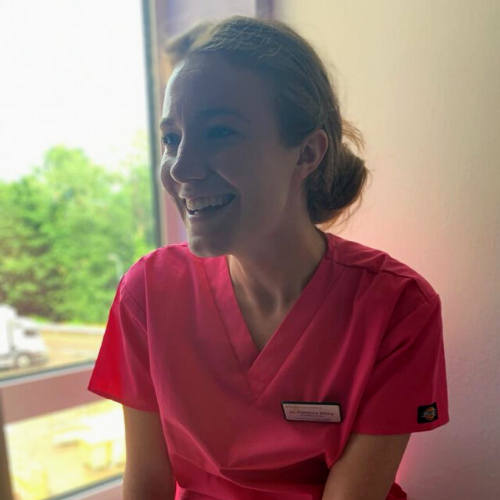
Pandora Bibby
Grant recipient Pandora Bibby (2012) completed her medical foundation training in the North East, and is in the second of seven years training at Basingstoke Hospital. She is undertaking her membership exams for the Royal College of Obstetricians and Gynecologists.
Read MorePandora Bibby

Pandora writes:
I feel very fortunate to have received support from the DHSA with my membership exams for the Royal College of Obstetricians and Gynaecologists (MRCOG). Obstetricians and Gynaecologists are required to pass all three parts of the MRCOG before being eligible for promotion to consultant. They are notorious for bringing recently qualified doctors back down to the exam room with a bump, after the high of graduating from medical school with the false sense that long revision sessions are a thing of the past.
Having completed my foundation training in the North East, I moved down to ‘Wessex’ to embark on my specialty training in 2020. Now in my second of seven training years, I am loving my role as a Senior House Officer at Basingstoke Hospital. No two days, or even two halves of the same day look the same. Ranging from a night shift on labour ward, to a morning antenatal clinic followed by an afternoon in the gynaecology operating theatre.
The single most important lesson from my time at Downe House was the value of strong female friendships. The empathy I learned as a friend translates into my working life on a daily basis, not just in caring for women, but also working alongside them.
Thank you to the DHSA for their continued support, it has been invaluable to have one less thing to think about in what has been a challenging couple of years working in the NHS. I am due to sit the second part of my MRCOG in a two years’ time and enjoying focusing on developing my clinical skills in the meantime.
